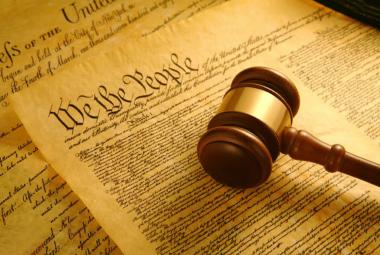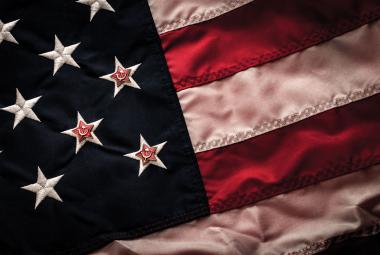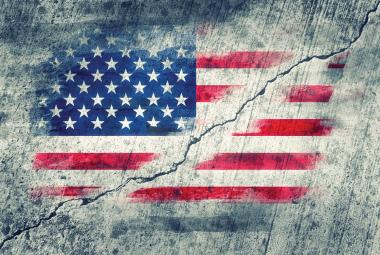Much has been said about the United States not being a Christian Nation. From the White House to the TV studio, Christianity’s role in the American Story has been questioned. What are the facts?
The Christian Church in the United States has been under attack for many years with the argument being that there is a “wall of separation between Church and State.” This term has been used so frequently that many people mistakenly believe it is written into the United States Constitution. Now, we are being told that the United States is not a “Christian Nation.” Is it true? Is there a separation between Church and State? Is the United States a Christian Nation?
Separation Between Church and State
In 1802, President Thomas Jefferson wrote a letter to the Danbury Baptist Association of Connecticut in response to their letter to him voicing concerns about religious freedom and the First Amendment to the Constitution.
The First Amendment to the Constitution states, in part, “Congress shall make no law respecting an establishment of religion, or prohibiting the free exercise thereof…” Courts have generally broken down this part of the amendment into two parts, the Establishment Clause and the Free Exercise Clause.
This part of the Amendment has its roots in the 1786 Virginia Statute for Religious Freedom, drafted by Jefferson. Until this law was passed in Virginia, ministers were required to preach Christianity according to the “doctrine, rites and religion” practiced by the Church of England. In 1611, the colony passed a law requiring everyone to attend church on the Sabbath. Later Virginia passed a law imposing a tax to pay for Anglican ministers’ salaries and to build new churches, and it allowed only Anglican clergymen to perform marriages. (Nine of the original thirteen colonies prior to the revolution had official state-established churches.)
The Danbury Baptist Association was very familiar with Jefferson’s earlier role in drafting of the statute and expressed their hope that as President, Jefferson might similarly free them from the constraints the government of Connecticut put on them in the way of making tax assessments that funded the established church in that State.
In his letter to them, Jefferson supported the idea that the First Amendment is a protector of people’s religious freedom from government interference. In part, Jefferson writes,
I contemplate with sovereign reverence that act of the whole American people which declared that their legislature should “make no law respecting an establishment of religion, prohibiting the free exercise thereof,” thus building a wall of separation between Church and State.
In this letter, Jefferson is reinforcing the restriction placed on government to interfere with the people’s free exercise of their faith, not a restriction on the people. Recent Supreme Court rulings have turned this concept on its head. At various times, the Court has ruled against praying in schools,1 reading the Bible in school,2 showing the Ten Commandments in school,3 or having religious displays at Christmas.4 This is quite different from the wall Jefferson envisioned, protecting the people from government interference with religious practice.
In 1984, United States Supreme Court (1984), Associate Justice William Rehnquist, in his dissenting opinion in the case of Wallace v. Jaffree, stated:
There is simply no historical foundation for the proposition that the framers intended to build a wall of separation [between church and state]. The recent court decisions are in no way based on either the language or intent of the framers.…
But the greatest injury of the “wall” notion is its mischievous diversion of judges from the actual intentions of the drafters of the Bill of Rights … The “wall of separation between church and State” is a metaphor based on bad history, a metaphor which has proved useless as a guide to judging. It should be frankly and explicitly abandoned.
When Thomas Jefferson wrote his letter to the Danbury Baptist Association he never intended the words “Separation of Church and State” to be taken out of context and used as a substitute for the First Amendment, but for all practical purposes that is what the courts have done.
At the very heart of the 1st Amendment is the concept that the government will not interfere with the people’s right to worship God in the manner of their choosing. The fact that the government has decided to regulate religion indicates that the government has breached that “wall.”
A Christian Nation
Much has been said about the United States not being a Christian Nation. From the White House to the TV studio, Christianity’s role in the American Story has been questioned. What are the facts?
On September 17, 1787, 39 of the 55 delegates at the American Constitutional Convention signed the Constitution prior to state ratification. Virtually all of the 55 writers and signers of the United States Constitution of 1787 were members of Christian denominations: 29 Episcopalians, 9 Presbyterians, 7 Congregationalists, 2 Lutherans, 2 Dutch Reformed, 2 Methodists, 2 Roman Catholics. (There was also 1 lapsed Quaker, and 1 Deist.)
These men had a near unanimity in fundamental beliefs based on a common background. While their level of formal schooling varied, they were all well read, and writings from the Convention showed these men to have a far broader knowledge of religious, political, historical, economic, and philosophical studies than would be found in almost any modern-day politician. They were also students of the Bible, especially the Old Testament, and even though their personal religious devotion may be questioned, the Biblical teachings were held in universal regard.
According to a University of Houston study, 34% of all the quotes of the Founding Fathers came from the Bible. Another 60% of their quotes came from men who used the Bible to form their conclusions. Therefore, a total of 94% of all their quotes either directly or indirectly cited the Bible (Lutz, 1988).
Blackstone’s Commentary on the Law, introduced in 1758, became the law textbook for lawyers for 160 years, and the Supreme Court quoted from it to settle cases. It explains that the three branches of government are based on Isaiah 33:22: 1) “For the LORD is our judge, (Judicial); 2) And the LORD is our lawgiver; (Legislative); 3) And the LORD is our king, (Executive); and it is He who will save us.” (ISV). The separation of powers is based on Jeremiah 17 and the tax exemption for churches is based on Ezra 7:24.
In his seminal work, Democracy in America, Alexis de Tocqueville wrote,
The revolutionists of America are obliged to profess an ostensible respect for Christian morality and equity, which does not permit them to violate wantonly the laws that oppose their designs…. Thus, while the law permits the Americans to do what they please, religion prevents them from conceiving, and forbids them to commit, what is rash or unjust.
He went on write, “There is no country in the world where the Christian religion retains a greater influence over the souls of men than in America.” There was a good reason for de Tocqueville to marvel at the “American Experiment” of a Christian-based democracy. His native France had just gone through a period of turmoil and de Tocqueville came to America to determine why one revolution succeeded and the other was an abysmal failure.
The American Revolution, he found, was a revolution based on Biblical principles, which yielded a stable civil government with relative internal peace. The French Revolution was a revolt of the mob where “reason” ruled.
While historians will point out that both revolutions came during the Age of Enlightenment, they were born from two sides of the same coin. In America, John Locke (1632 –1704) was one of the philosophers the Founding Fathers looked up to. Locke was an English philosopher who is widely considered as the Father of Classical Liberalism. Locke believed that one of the responsibilities of government was to protect private property in courts of law rather than each man acting as their own judge and jury.
The French venerated Jean-Jacques Rousseau (1712–1778), who saw the government as the vessel to implement the “general will” and to create more moral men. Through the unchecked power of the state, the government would “force men to be free.” For Rousseau the Christian, “… if he takes his theology seriously, he focus’s his attention upon the afterlife and puts little value upon this one; to that extent he is a poor citizen. … he has only one fatherland, the Church.”
Contrast this with what Thomas Jefferson wrote: “The reason Christianity is the best friend of government is because Christianity is the only religion in the world that deals with the heart.”
With Rousseau as their guide, the French mob seized the reins of government and vowed that from that time forward, reason, not faith, would prevail. The revolutionaries then began to de-Christianize the country. A “Festival of Reason” was celebrated in Notre Dame Cathedral on November 10th and an opera singer was dressed as the goddess of reason and enthroned in the church. The Gregorian calendar was abolished as a sign of the end of the Christian era. No Christian holidays were to be celebrated. The names of the days of the week were changed, and the number of days was increased to ten. The months were changed also, as the break with the past had to be complete. All religious funerals were forbidden in Paris, and 2,436 churches were closed, some being turned into dance halls.
The Anarchist Jean Baptiste Clootz wrote, “Religion is a social disease which cannot be too quickly cured. A religious man is a depraved animal.”5
Instead of the “rule of law,” “the people”—and the guillotine—reigned. Approximately 16,000 people went to the guillotine in the nine months of the Terror, a period in French history that truly lived up to its name, and about the same number died in prison. While the United States grew to be the eventual sole superpower, France decended into chaos.
Our Obligations
While the United States is a nation founded on Christian Principles, we would be hard pressed to say that the United States is a Christian Nation. There is no emphasis on the Word of God, and Biblical principles are rarely seen in public discourse.
The American people of today are very much like those living in the days of Jeremiah. Israel at that time had rejected God, but the people were still making a pretense of following Him. Jeremiah’s message was that such a people will find themselves rejected by God and by the world.
America is following that same path. We have brought lawlessness into our own land. We find ourselves despised by other nations. God said it would be that way. No people can pretend to be God-fearing, and expect the world to look up to them. Jeremiah’s message in his day applies to us as well, that a people who turn away from God will find that God turns away from them.
Many people today say that there is nothing they can do to turn things around even if they wanted to. In this month’s election, many are saying they are not going to vote. After all, they argue, one vote doesn’t mean anything and that nothing will change, no matter who is elected. In effect they are saying that because neither candidate measures up to a perfect standard, they are content to stand on the sidelines. While it is a temptation to “sit this one out,” it is the duty of every citizen to study the issues and cast an informed vote.
Christians need to remember that voting is a Biblical duty. The Holy Spirit, through Paul, admonishes us to submit ourselves to the governing authorities (Romans 13). What we often fail to realize is that God uses His people as agents to help determine who the governing authorities will be. Just as in the Old Testament, He sent Samuel out to pick his leaders, so He calls us in a free democratic society to choose, by our votes, the leaders He then ordains.
When a nation forgets their God and their national responsibilities, there are consequences. Paul brought us this admonition: “Be not deceived; God is not mocked: for whatsoever a man soweth, that shall he also reap.” (Galatians 6:7, KJV)
So this Election Day, you must prove those words true by doing the sowing God has called us to do: vote.
Notes:
- Engel v. Vitale (1962)
- Abington School District v. Schempp (1963)
- Stone v. Graham (1980)
- Supreme Court and lower federal courts have issued inconsistent rulings on this point, approving some religious displays while ordering others to be removed. For instance, 5 years after approving a nativity scene in Pawtucket RI, the Supreme Court ruled that a nativity scene on the staircase of a Pittsburgh, Pa., courthouse was unconstitutional.
- Nesta H. Webster, The French Revolution, Hawthorne, 1983, p. 55.
Sources
- Adams, J. Q. (1803). Memoirs of John Quincy Adams, Vol. I, p. 268. Philadelphia: J. B. Lippincott and Company.
- de Tocqueville, A. (1838). De la démocratie en Amérique (Democracy in America). NY: Project Gutenberg.
- Lutz, D. (1988). The Origins of American Constitutionalism. Houston, TX: University of Houston.
- Skousen, W. C. (1981). 5000 Year Leap. Franklin, TN: American Documents Publishing, L.L.C.






